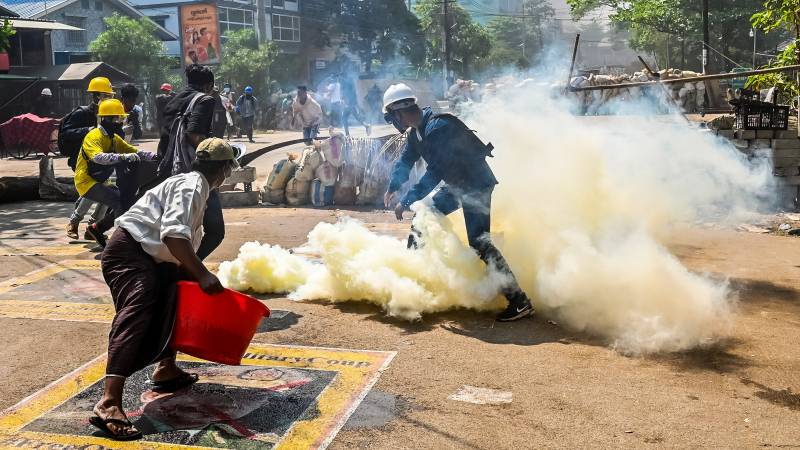Crackdown triggers exodus from Myanmar's biggest city

Stay tuned with 24 News HD Android App

Roads out of Myanmar's biggest city were choked Friday with people fleeing the junta's deadly crackdown on anti-coup dissent, as authorities in neighbouring Thailand said they were preparing for an influx of refugees.
Myanmar has been in turmoil since the military ousted civilian leader Aung San Suu Kyi on February 1, triggering a mass uprising that security forces have sought to crush with a campaign of violence and fear.
At least two more protesters were killed Friday in a small trading town in northeastern Myanmar, a funeral home employee told AFP by phone, bringing the confirmed death toll across the nation since the coup to nearly 230.
The junta also this week imposed martial law over six townships in Yangon, the nation's former capital and commercial hub, effectively putting nearly two million people under direct control of military commanders.
Some of those areas have become battle zones, with protesters firing sling shots and throwing petrol bombs at security forces who have fired live rounds. Smoke has also risen above nearly deserted streets, with security forces burning barricades made of vehicle tyres and fences that have been set up by protesters.
On Friday, local media showed traffic clogging up a main highway going north out of Yangon, reporting that people were fleeing the city for rural areas.
AFP also spoke with residents who had already fled or were preparing to leave.
"I no longer feel safe and secure anymore -- some nights I am not able to sleep," a resident near one of the districts where security forces have killed protesters this week told AFP. "I am very worried that the worst will happen next because where I live... is very intense, with security forces taking people from the streets."
The woman said she had bought bus tickets for her home state in Myanmar's west and would leave in a couple days. One resident told AFP he feared being shot by security forces, who had been threatening people if they did not clear barricades.
"We are like house rats searching for something to eat in another person's kitchen," said one man who described the fear of leaving his house this week to get milk for his two children.
Multiple residents across the city told AFP that soldiers and police were forcing them at gunpoint to remove barricades protecting their neighbourhoods.
A 29-year-old man who works as a goldsmith in Yangon told AFP by phone he had left the city. "It was too distressing to stay," he told AFP. "After arriving here in my home, I feel much more relieved and safe."
Mobile data across Myanmar has also been down since Monday, plunging those without Wifi set-ups into an information blackout.
Preparing for refugees
Across the Myanmar border in Thailand's Tak province, authorities said they were preparing shelters for an influx of potential refugees. "If many Myanmar people flow across the border because of an urgent case, we have prepared the measures... to receive them," said provincial governor Pongrat Piromrat.
He said Tak province would be able to support about 30,000 to 50,000 people, though he confirmed that no one appears to have flooded across the border yet. About 90,000 refugees from Myanmar already live along the porous border, fleeing decades of civil war between the military and ethnic armed groups.
The junta has repeatedly justified the power seizure by alleging widespread electoral fraud in November's elections, which Suu Kyi's National League for Democracy (NLD) party had swept in a landslide.
Since February 1, more than 225 people have been confirmed killed and 2,000 detained, according to a tally from the Assistance Association for Political Prisoners monitoring group released before more bloodshed was reported on Friday.
According to an NLD MP, the party's information officer Kyi Toe -- who had regularly posted updates about the Nobel laureate's health and whereabouts -- was arrested on Thursday night in Yangon.
Many of the ousted MPs are in hiding, and have formed a group called the Committee Representing Pyidaungsu Hluttaw (CRPH) -- the Burmese word for "parliament". This week, the CRPH's UN envoy -- who goes by the name Dr Sasa -- and its vice president Mahn Win Khaing Than were charged with "high treason".
